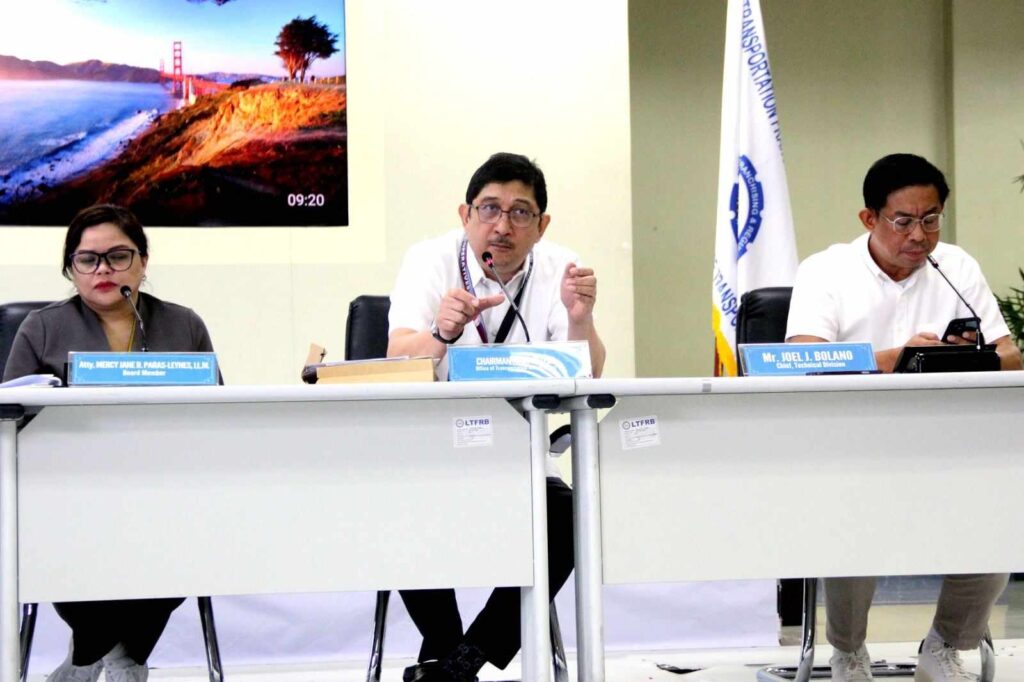
LTFRB Board Member Atty. Mercy Paras Leynes, Office of Transport Cooperatives Chairman Jesus Andy Ortega and LTFRB Technical Division Chief Joel J. Bolano explained to the members of the media on what will happen after the Dec. 31, 2023 deadline of the consolidation program of the industry sector under the government’s Public Utility Vehicle Modernization Program (PUVMP) during a press conference on Friday, Dec. 29, 2023. — Photo by Perfecto T. Raymundo, Jr.
By Perfecto T. Raymundo, Jr.
QUEZON CITY – The Land Transportation Franchising and Regulatory Board (LTFRB) on Friday (Dec. 29) divulged that they will focus on other components of the Public Utility Vehicle Modernization Program (PUVMP) after the Dec. 31, 2003 “deadline” of the consolidation of the industry sector.
In a press conference, Atty. Mercy Paras Leynes, Board Member of LTFRB, said that “after Dec. 31, we can also focus on other components of the PUVMP. Financing component will be improved. With nine components of the PUVMP will be focused for the commuter welfare.”
“The DOTr (Department of Transportation) and the LTFRB, including the OTC (Office of Transport Cooperatives), knows that the commuting public deserves better,” Leynes added.
She noted that the Memorandum Circular 2023-052, which is posted on the website of the LTFRB, provides that those who have not been consolidated by Dec. 31, 2023, they will still be allowed to ply the routes where there are no PUJs who have consolidated themselves.
“However, they will be issued a ‘show cause order’ in order to have due process,” Leynes said.
By Dec. 31, 2023, she said, the LTFRB will be able to identify those transport units who have not consolidated themselves into cooperatives or corporations.
“Looking at the whole universe of the available modes, the LTFRB is not expecting a transportation crisis by January 2024,” Leynes said.
She added that the adjacent routes who have been consolidated will be considered or looked into to ply the routes where there are no consolidated operators or units or entities.
“There are other available transportation modes or road transport service or mode of transportation such as jeepneys or PUVS. Even the buses can still provide the needed mass transport mode,” Leynes said.
She stressed that letters were sent to the LGUs (local government units) who have less consolidated routes, so that they can take the appropriate action in order to address the affected routes.
“The reason why there were coordination with other enforcement agencies, so that there would be no more ‘flagging down’ of the entities who have not been consolidated,” Leynes said.
The Office of the Solicitor General (OSG), which is the government’s main legal counsel, have given a “non-extendible” period of 10 days within which to submit their comment on the petition filed by PISTON (Pinagisang Samahan ng Tsuper at Opereytors Nationwide) before the Supreme Court (SC) seeking the issuance of a temporary restraining order (TRO) to stop the consolidation program.
Atty. Zona Russet M. Tamayo, LTFRB National Capital Region regional director, said that since the consolidation is still up to Dec. 31, 2023, they cannot just yet give the data or numbers of those who have consolidated themselves into cooperatives or corporations.
“In the NCR, only 26 percent have consolidated before December 2023. The LTRFB figures showed that 33.21 percent of all operators in the NCR have consolidated which is translated to 13,893 organized units covering 317 routes in NCR, majorirty of which, which is UV Express, 44.3 percent covering 3,259 units for 81 routes,” Tamayo said.
“Overall, jeepneys, 35 percent or 34.9 percent total consolidated. For NCR 17,152 in terms of routes, and consolidated routes 47.3 percent of all routes in Metro Manila,” she added.
“We are concentrating on the 35 percent of the PUJs. Not included are the other modes of transport in Metro Manila. We are talking of buses or taxis,” Tamayo said.
“I would like to emphasize that in the major thoroughfares in Metro Manila, they have consolidated. Majority of those who have not consolidated, consist of short routes where there are other modes of transport for the short distance that can still cater to the commuters,” she added.
“Come January 2024, we will be able to identify those who have consolidated and those who have not consolidated. Hence, there is no transport crisis by January 2024,” Tamayo said.
Regarding the data and final list of the consolidated cooperatives, Tamayo said that “hindi po namin maibibigay ngayon. However, come January 2024, noting the 60 percent can only be identified after the Dec. 31, 2023 deadline.”
“By first week of January 2024, the list of the consolidated cooperatives will be released by the LTFRB,” she added.
“We have already extended all the leniency such as reduced documentary requirements, simplify the process and open even on Saturdays,” Tamayo said.
“The LTFRB offices nationwide have been opened even on Saturdays and even on the last Sunday of December just to accommodate those who would like to be consolidated,” she added.
“Let’s all take into consideration that the PUVMP was conceptualized in order to provide convenience to the commuting public, including the consolidation of the industry sector,” Tamayo said.
“Yung hindi pa nagkoconsolidate sa ngayon, majority of which, have distance of about seven kilometers, pero mayroon other modes of transport of which the commuters have the option to avail of.” She added.
Tamayo cited for an example that those who won’t like to take the taxi, they can still take the bus and other mode of transport for the routes where there no consolidated entities.
She explained that the “show cause order” is part of due process, which is a legal measure under the Public Service Act.
Joel J. Bolano, LTFRB technical division chief, said that there are provisions on MC 2023-052 on what will happen after Dec. 31, 2023, considering that more the 60 percent of the public utilities have already consolidated themselves into cooperatives or corporations, hence, they can start plying their respective routes.
“They are given the period of until Jan. 31, 2023 so that they can still ply their route through special permit. Pending the permits on assignments of other routes for those who have yet to be consolidated, especially PUJs PUVs,” Bolano said.
“Once the units or operators who have not consolidated are identified, they will still be issued a special permit in order for them to still ply their respective routes,” he added.
“Basically, we are not seeing no transport crisis in the adjacent areas. Under MC 2023-047, those entities who have not consolidated by Dec. 31, 2023, they can still group themselves and avail of the consolidation program.” Bolano said.
Jesus Andy Ortega, OTC Chairman, said that individuals are continuously availing the modernization program of the transport industry sector.
“101 have actually applied for cooperatives. by Dec. 31, they will return to the OTC. This number shows that the 65 cooperatives have been approved by the OTC throughout the year of 2023,” Ortega said.
“Especially when PBBM (President Ferdinand ‘Bongbong’ R. Marcos, Jr.) made the announcement, more and more have expressed their willingness to consolidate into cooperatives or corporations in line with the industry sector component of the modernization program of the government,” he added.
Ortega noted that the offices of the DOTr, OTC are open and will be open today, tomorrow and until Dec. 31, 2023 at 5 p.m. to accommodate those who would still avail of the consolidation of the transport industry under the PUVMP.
The 101 units have already consolidated themselves into cooperatives just for the month of November 2023 wherein, 60 cooperatives have actually become full-pledged cooperatives and the 101 may still add up to the total number of consolidated units.
“Clearly, there are other transport modes. In between 3 to 4 kilometers are the routes of those who have not consolidated. Talaga pong tuloy-tuloy na magtutulungan kami, including the DILG, LGUs and other concerned government agencies in order to have a reliable, convenient and safe travel,” Ortega said.
“We still have three days para makahabol sa deadline. Sana mahikayat pa ang ibang ayaw magconsolidate na magconsolidate na,” he added.
“Tuloy-tuloy na inaaddress ang concerns ng mga operators or units sa amount to be produced for the consolidation. The OTC have reiterated the proper amount to shell out for the consolidation program,” Ortega said.
“The LTFRB, OTC and LTO will see to it that the commuting public will have a convenient travel. The DOTr and the LTFRB will expedite the issuance of special permits in order to bring about the difference for the commuters,” he added.



